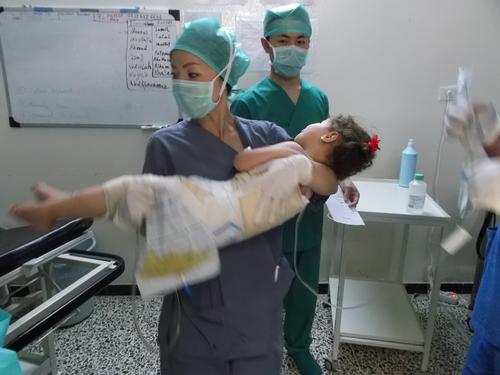The volatile security situation in Syria means that Médecins Sans Frontières (MSF) is forced to manage some of its projects remotely, from outside the country. Michael Hering from Melbourne, Australia, recently spent six months as Logistics Coordinator in Gaziantep, Turkey, managing projects across the border in Syria.
“Within Syria, there are projects completely staffed by Syrians as in a number of areas the chance of international staff going in is very remote. I was regularly in contact with people across the border, training staff, organising things and reacting to emergencies. Working with Syrian staff so closely, you definitely get a sense of the difficulties they face. Some have lost family members, or other people close to them. It’s a very desperate situation to say the least. Barrel bombs have been dropped on market places, bus stops – there’s no regard for human life. People in Syria don’t know when the next bombs are going to fall. It’s very indiscriminate; a horrible situation to be in.
It’s also hard for people to leave Syria, and if they do it can be difficult and dangerous, so I think people feel trapped. The surrounding countries are struggling as well, with so many refugees flooding in. I also heard stories of Syrian people who could leave but didn’t because they wanted to stay and contribute to their country. This includes some of our own staff. They are so dedicated to what we do, because they can make a difference to what is a desperate situation. People are traumatised, but somehow they still go on, which is quite amazing. It was a privilege to work with them.
A burns hospital and supply project
As Logistics Coordinator I was managing logistics for two main projects in Syria. One was a 16-bed hospital that MSF is running in northern Syria, which focuses mostly on burns and has an emergency room and operating theatre. The hospital is fully staffed by Syrian people, and is very important to the local community as it has the only specialised burns unit in the area.
The other key project involved providing medical supplies and logistics support to 22 non-MSF health structures in Syria. This was actually the larger project, in which we supported clinics with medical kits, hygiene kits and fuel on request. We also provided logistics support, such as spare parts for ambulances as needed, and additional support during emergencies like bombings or airstrikes. I managed the supply chain for this project, so I organised purchasing and transporting supplies from France to Turkey to the health centres in Syria. There’s still limited manufacturing within Syria, so I was also able to organise some local purchasing.
Training via Skype
A big part of my role was training staff on the other side of the border, mostly using Skype. Many people have left Syria, including a lot of professionals. Most of our staff were well educated, but they didn’t have specific logistics skills, which is why training was so critical. There are also limited education opportunities within Syria, so we tried to help our staff as best as possible in terms of training.
I was lucky enough that my assistant, the logistics officer based in Syria, was able to come into Turkey for face-to-face training. That was fantastic. The training focused on all MSF’s ‘logistics families’ – from water and sanitation, to electrical safety and vehicle maintenance. We also worked on biomedical management systems because the health structures we support have a lot of biomedical equipment that needs to be maintained.
Brilliant local staff
This was my sixth field placement with MSF, but the first time I’ve worked in a ‘remote management’ project. Training was a prime example of the limitations of the set up. Not being able to see people face-to-face, not being able to use any props or other training tools, made things difficult. But our staff were brilliant, absolutely fantastic, which made things run very smoothly and efficiently, despite the limitations. I loved doing the training, especially because I saw people develop their skills very quickly. That was the most rewarding part of this mission for me.
Another frustration of remote management was not being able to visit the people that you’re working with, that you share so much with. It was a touching mission in terms of how we worked as a team. You form very strong friendships, and I still keep in touch with some of the people I met. Now that I’m home, whenever I hear about what’s happening in Syria, my mind does turn to the people I met. From here, I watch the news and hope the best for Syria. It doesn’t seem like the conflict will end any time soon, but I’m always hoping there’s a light at the end of the tunnel, somehow.”



